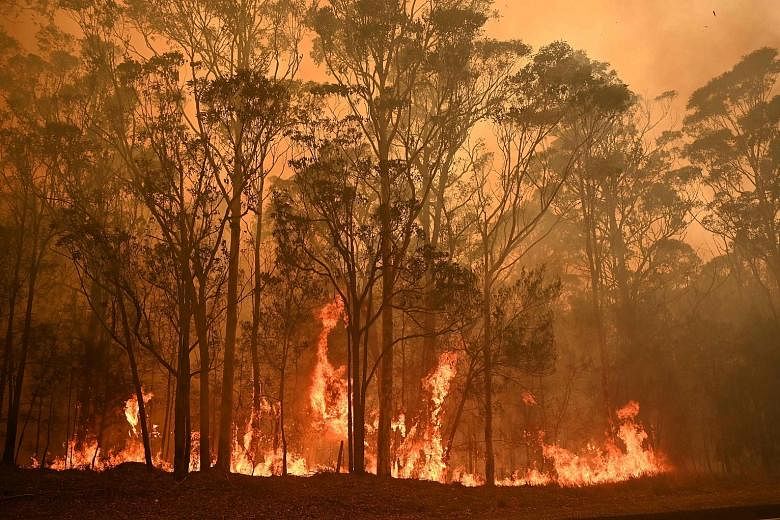NOWRA (New South Wales) • The smoke is still smouldering from the wildfires that ravaged the small seaside town of Broulee, in Australia's New South Wales, on New Year's Eve, when sand dunes erupted into flames and entire neighbourhoods were decimated.
Water and food are running low.
Shops are taking only cash, and radio is the main source of information.
The fires could intensify, as strong winds and high temperatures threaten to create even more dire conditions in the town and more than a dozen others.
Mrs Clarinda Campbell and her two children left Broulee, heading for safety. Her husband, James, stayed behind to defend their home.
"I feel like it's not real," said Mrs Campbell, who was with her children at a family property in Surf Beach, about 13km away.
"I've gone to sleep every night and woken up every morning hoping that it was just a bad dream."
The authorities urged tens of thousands of people, mainly along Australia's south-eastern coast, to evacuate before the weekend.
The populations of many of these towns swell during the holidays, with travellers looking for a break at the beach. Not all residents were heeding the warnings to leave.
Some wanted to protect their homes from the blazes. Others worried that fleeing could put them in more danger if they ran out of fuel, encountered fallen trees or ended up in another fire zone on the clogged roads.
While the past few months have been particularly bad, Australians are accustomed to the unpredictable nature of wildfires, an annual occurrence on what is the most arid continent on earth. Many are therefore willing to take their chances, to the dismay of officials.
Mr Rob Rogers, the deputy fire services commissioner for the state of New South Wales, was blunt: There would be no help for anyone who ignored the warnings to leave.
"We've been very honest about the risk, but if people choose to stay, that's on them," he said at a briefing last Friday. "Do not expect there to be a fire truck when you ring."
When the fires swept through on New Year's Eve, Mr Bernard Kreet huddled with 300 others at the local golf club, waiting to see the damage in the suburb of Catalina, where he lives. He said that about 20 homes have been destroyed.
With concern of more fires, tourists were asked to leave the area, and many locals followed.
Mr Kreet said he thought the town would be spared, even if he expected further disruptions and supply limitations.
He is hosting two families who have evacuated from other places.
"It's so hard to get out of town," he said, adding that the roads in many seaside towns were not built to handle so many travellers. "It's chaos down here."
Fires now ring much of Australia's east and south-eastern coasts. The streets of Broulee, normally bustling with people, are eerily quiet.
About 80 per cent of residents have left, estimated Mr James Campbell. To help protect his home, he borrowed equipment from a former firefighter neighbour across the street, put water into buckets and hooked up a fire pump to the backyard pool.
"You shouldn't have to deal with this once in a lifetime, let alone twice in a week," he said.
His parents lost most of their property in nearby Jeremadra, although their home was somehow saved. "You can't imagine what it looks like," Mr Campbell said.
"Just matchsticks. The trees are all burned. Where there was dense undergrowth is now just sand."
NYTIMES

